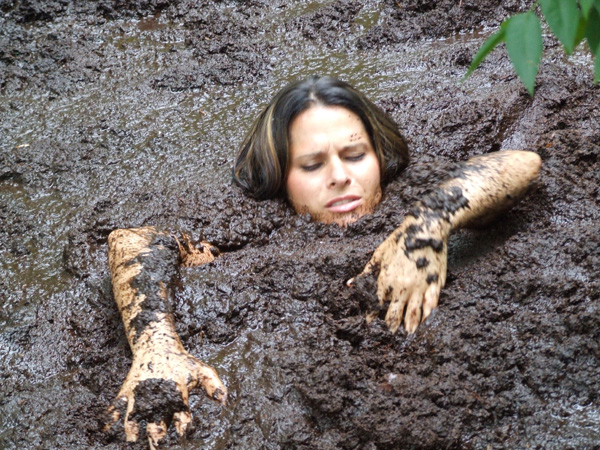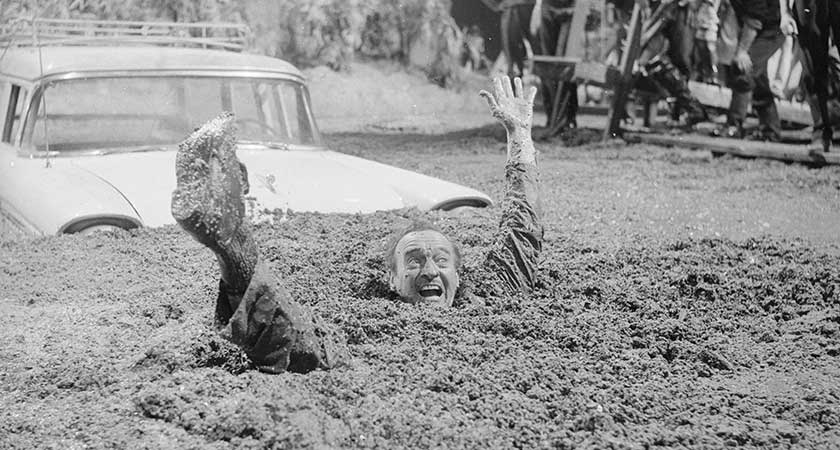
The second explanation for quicksand’s popularity, I think, is mainly how easily it inserts itself into any adventure-adjacent film. The colonial era obviously predates the invention of cinema by a century or two, but the late nineteenth century saw a surge of the trope in literature, to the point that even respectable authors like Bram Stoker and Arthur Conan Doyle (in the seminal Hound of the Baskervilles, no less) were making use of quicksand. Compared to some of the wilder tales from explorers, the concept of sand that sucked you down to your doom was barely even a stretch. In the first place, the so-called Age of Exploration™ (also known as the Age of Evil Colonialism™) lit up the public imagination with the idea that there were endless possibilities for what could be found in the world-everything from sea monsters to fountains of youth to headless people with faces in their chests. I think the answer to the first question is twofold. If quicksand is really so dull, though, how did it become such a popular trope in cinema? And how did it disappear just as quickly (no pun intended, because I’m not a hack)? While quicksand can and does kill people from time to time, it never does so by swallowing them up never to be seen again the best it can hope to do is hold you in place until you die from dehydration or exposure -one of the slowest and least dramatic deaths possible. You can try as hard as you want to sink in a substance denser than you, but it’s not going to happen.

You might get stuck in the stuff, but you won’t sink in over your head as a mixture of water and rock, quicksand is far more dense than even the most ardent anti-masker. Quicksand, while it exists, is exceptionally rare, requiring a rather unusual confluence of ingredients (sand, water, clay, salt) to mix in the exact right ratios to the extent that it exists, it’s not all that dangerous. While quicksand can and does kill people from time to time, it never does so by swallowing them up never to be seen again the best it can hope to do is hold you in place until you die from dehydration or exposure.Įxcept, you’re a Smart Person of the Internet Era™, so you know that none of that is true. In a matter of minutes he’ll have disappeared and his quest will all be for naught. Then, without warning, the very ground gives way beneath his feet! He reaches for a branch, a vine, anything-but it’s no use! He’s being sucked down, down, into the earth.

If you were born sometime between the fifties and the eighties, you know the trope well: the hero trudges confidently through the wilderness, whip in hand, smirk on face, ready to take on whatever nature throws at him. He plucked me out of a pit of confusion, even out of the quicksand he placed my feet on a rock and established my steps. Harrington looks at one of the random obsessions to have gripped the public mind in the recent past, and tries, in vain, to make sense of it all. Rip tides account for 60 per cent of all RNLI lifeguard incidents and Sussex officials have been quick to say that tragedies remain rare.Ī council spokesperson said: "While it's very upsetting to see two similar, tragic incidents this summer, over the years these kind of incidents are extremely rare and on a fine day around 25,000 people use the beach safely.Every other Wednesday in Fads!Crazes!Panics!, Luke T. Source: RNLI For more information go to: Do not go into the water yourself – many people drown trying to save others. If you have something that floats or they can hold on to, throw it to them. Keep calm and call for help or swim for safety if you are able.Ĭall 999 or 112 and ask for the coastguard. Relax, float on your back to catch your breath and try to grab something that will help you float. Have someone keep an eye on you from the beach, and make sure they have a means of calling for help if something goes wrong.

The British sea is cold, so take time to get used to the temperature. Make sure you know your limits – remember, swimming in the sea is very different to swimming in a pool. Visit beaches with lifeguards and swim between the red and yellow flagsģ.

Go with friends and look out for one another, and always have your phone on you at the beach.Ģ. Remember it is easy to get into trouble in the waterīe aware of the dangers and do not take risks.


 0 kommentar(er)
0 kommentar(er)
